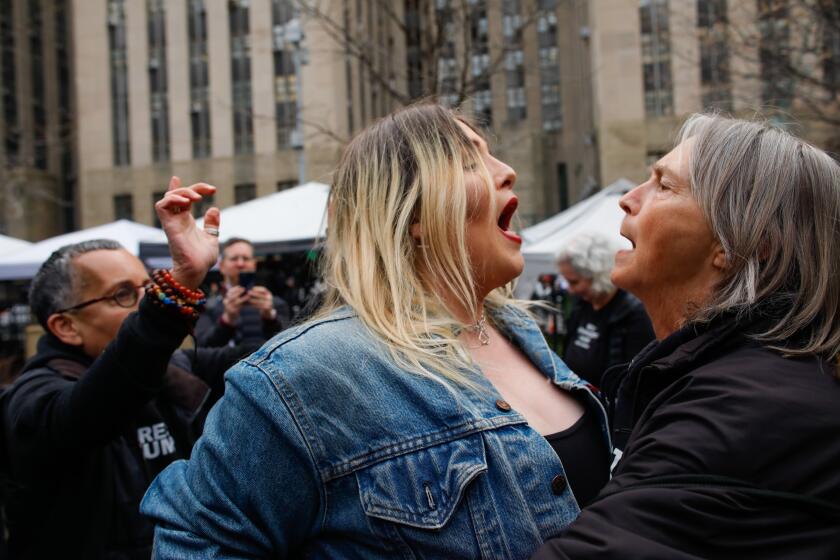When is it wrong to urge social media platforms to take down false information?

- Share via
A decision on Friday by a three-judge panel of the U.S. Court of Appeals for the 5th Circuit puts in jeopardy one of the few tools that exist to deal with false speech on the internet.
The court ruled that the White House, the FBI, the surgeon general’s office and the Centers for Disease Control and Prevention cannot communicate with social media platforms to encourage them to remove false speech. Although it narrowed a federal district’s broader injunction issued in July, the appeals court left in place a restriction of important speech by the federal government.
Abcarian: Lies, damn lies and social media — there’s a reason this country is so deeply polarized.
Can making nice with our political opposites change the underlying dynamic driving polarization? Not while social media disinformation thrives unchecked.
False speech over the internet and social media can do great harm, even causing the loss of life. One aspect of the case involved the federal government’s concerns with false information being spread about COVID-19 and vaccines on social media. Federal officials rightly feared that false claims by anti-vaxxers would reduce vaccinations and put lives in jeopardy.
The lawsuit against the Biden administration was brought by Louisiana and Missouri along with a website owner and four people who opposed the government’s COVID-19 policy, among other issues. A federal district judge in Louisiana issued an injunction against the White House and many federal agencies.
The 5th Circuit ruling reversed the injunction against several agencies, including the departments of State, Homeland Security, Health and Human Services and the National Institute of Allergy and Infectious Diseases. But it left much of the injunction in place for four agencies.
A new poll of California voters finds widespread concern over disinformation regarding politics and elections, but little agreement on whom to trust.
The court in its decision relied on a 1963 decision that involved the government threatening obscenity prosecutions against booksellers. Government coercion violates the 1st Amendment. But there is no evidence that the Biden administration threatened any social media company with prosecution or any enforcement action.
The court said Biden administration officials “threatened — both expressly and implicitly — to retaliate against inaction. Officials threw out the prospect of legal reforms and enforcement actions while subtly insinuating it would be in the platforms’ best interests to comply.” But telling someone that the failure to act could lead to new laws and regulations is not coercion. Never did the government warn the social media companies that they were violating the law and would face punishment if they did not accede to requests to remove content.
Gen Z grew up with social media, but that doesn’t mean they know how to recognize misinformation they see on the platforms.
The court said the administration violated the 1st Amendment by encouraging the platforms to engage in content-moderation of false speech. It concluded that the officials “significantly encouraged the platforms to moderate content by exercising active, meaningful control over those decisions.” There is nothing, however, in the opinion that shows the government exercised “control” over the content on social media. Encouraging platforms to remove false content does not violate the 1st Amendment.
The panel declared that “social-media platforms’ content-moderation decisions must be theirs and theirs alone.” That is certainly right, but it is ironic to read this reasoning since the same court last year upheld the constitutionality of a Texas law that prohibits internet and social media platforms from engaging in content moderation. There is no way to reconcile that decision with the 5th Circuit panel now proclaiming that social media companies get total say over the content on their platforms.
A landmark U.N. climate report this week broke new ground by finally highlighting the role of misinformation in obstructing action, singling out the United States as hotspot.
A petition for review of last year’s case is now pending before the Supreme Court. Likewise, the Supreme Court will be asked to review Friday’s ruling on an expedited basis; the 5th Circuit panel said its decision would not go into effect for 10 days to permit Supreme Court consideration.
The Supreme Court should take both of these cases and make clear that internet and social media companies have the right to decide on the content on their platforms. The Texas law prohibiting content moderation is thus unconstitutional. But it should be constitutional for the government to encourage removal of false speech from social platforms, so long as no coercion occurs.
The challenge is to find ways to combat the spread of false information that can harm public safety without jeopardizing freedom of expression. The government identifying false speech and notifying social media companies is a sensible way to address this problem.
Erwin Chemerinsky is a contributing writer to Opinion and the dean of the UC Berkeley School of Law. His latest book is “Worse Than Nothing: The Dangerous Fallacy of Originalism.”
More to Read
A cure for the common opinion
Get thought-provoking perspectives with our weekly newsletter.
You may occasionally receive promotional content from the Los Angeles Times.













